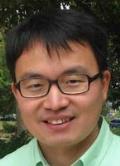
Meng Deng

Associate Professor of Biological Engineering
Ph.D. in Chemical Engineering - University of Virginia; B.E. in Chemical Engineering - Tsinghua University
Training Group(s):
Biotechnology
Microbiology, Immunology and Infectious Diseases
Active Mentor - currently hosting PULSe students for laboratory rotations and recruiting PULSe students into the laboratory; serves on preliminary exam committees
Current Research Interests:
Our research lies at the interface of materials science, micro/nano-scale engineering, and cell biology/medicine. Of particular interest is to develop an integrated research program for both the fundamental understanding of cellular processes in tissue development and engineering effective biomaterial systems for tissue repair and regeneration. Our strategies embrace the mechanistic elucidation of various chemical and topographical cues on cellular processes, and application of advanced biomaterials and matrix technologies at the micro- and nanoscale. For example, advances in polymer science have allowed for the design of biomaterials for a specific medical application, while nanotechnology has provided a robust toolbox for the fabrication of tissue-specific architectures. Our work spans from basic science to translational technology. Specifically, we focus on the three thrust areas: (1) cell engineering, (2) advanced biomaterials, and (3) regenerative engineering. In the area of cell engineering, we are interested in understanding of cellular processes and research effective methods to modulate cell function (e.g., via delivery of inducerons); In the area of advanced biomaterials, we focus on rational design of new polymers and composites by exploiting synthetic chemistry and study of cell-material interactions. In the arena of regenerative engineering, we seek to develop effective bioengineered systems with cell-instructive cues for regeneration of complex tissues and tissue interfaces. There are natural synergies among all the three research areas.Selected Publications:
1. Jiang, C., Cano-Vega, M.A., Yue, F., Kuang, L., Narayanan, N., Uzunalli, G., Merkel, M.P., Kuang, S., Deng, M.: Dibenzazepine-loaded nanoparticles induce local browning of white adipose tissue to counteract obesity. Molecular Therapy, 2017, 25:1718-1729.
2. Narayanan, N., Jiang, C., Wang, C., Uzunalli, G., Whittern, N., Chen, D., Jones, O., Kuang, S., Deng, M.: Harnessing fiber diameter-dependent effects of myoblasts towards biomimetic scaffold-based skeletal muscle regeneration. Frontiers in Bioengineering and Biotechnology, 2020, 8:203.
3. Yue, F., Huang, D., Qiu, J., Deng, M., Kuang, S.: Polymeric nanoparticles functionalized with muscle-homing peptides for targeted delivery of PTEN inhibitor to skeletal muscle. Acta Biomaterialia. 2020, 118:196-206.
4. Narayanan, N., Lengemann, P., Kim, K.H., Kuang, L., Sobreira, T., Hedrick, V., Aryal, U.K., Kuang, S., Deng, M.: Harnessing nerve-muscle cell interactions for biomaterials-based skeletal muscle regeneration, Journal of Biomedical Materials Research Part A, 2021, 109(3):289-299.
5. Narayanan, N., Jia, Z., Kim, K., Kuang, L., Lengemann, P., Shafer, G., Bernal-Crespo, V., Kuang, S., Deng, M.: Biomimetic glycosaminoglycan-based scaffolds improve skeletal muscle regeneration in a murine volumetric muscle loss model. Bioactive Materials. 2021, 6(4):1201–1213.
- Faculty Profile

